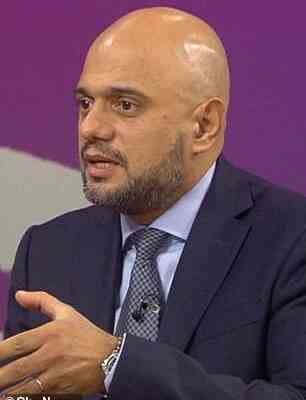Sajid Javid said an ‘honest debate’ is needed immediately about how the NHS can adapt to keep functioning, such as to a European-style model, or it won’t ‘survive many more years
The NHS will die without ‘fundamental reform’, ex-Health Secretary Sajid Javid has warned.
The Tory MP criticised the £150billion-a-year health service for failing to keep up with the ever-changing demands of British society.
He said that the system, created in the 1940s, was stuck in the past and it was time for an ‘honest debate’ on whether now marks the right time for Britain to shake-up its healthcare.
Mr Javid suggested other models, such as having the wealthiest pay for some of their care or schemes based on private health insurance, could be the best way forward.
An all-time high of 7million patients are stuck in a backlog for routine treatment, with hundreds of thousands facing year-long waits, often in pain.
One in eight have already sought out private care, data suggests. And experts fear the crisis, exacerbated by the pandemic, will only get worse.
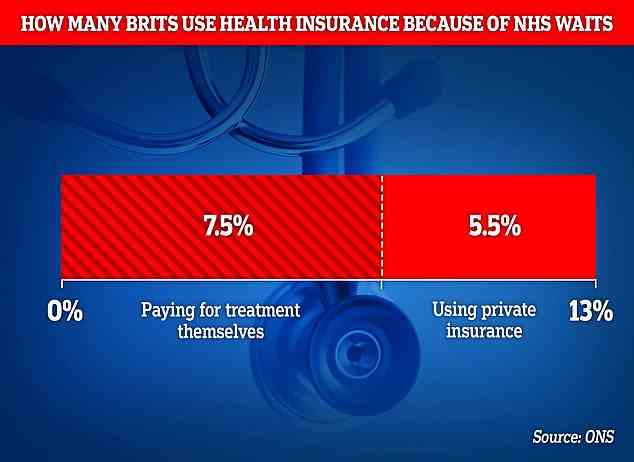
The Office for National Statistics asked around 2,500 of adults in the UK whether they had sought care privately because they felt the wait for care was too long in the NHS. Some 13 per cent said they had gone private, of which 5 per cent used private insurance, while 7 per cent forked out their own cash to do so
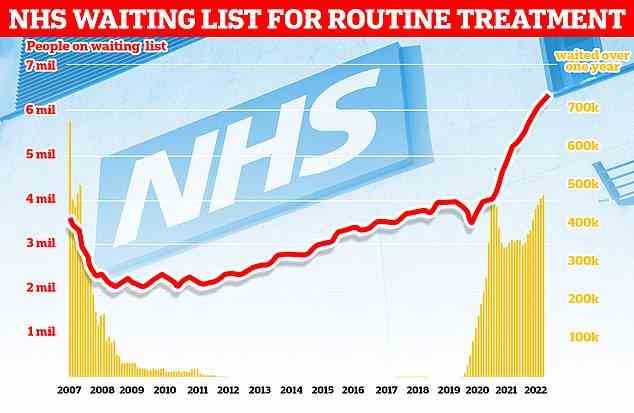
More than 7.2million patients in England were stuck in the backlog in October (red line)— or one in eight people. More than 400,000 have queued for at least one year (yellow bars)
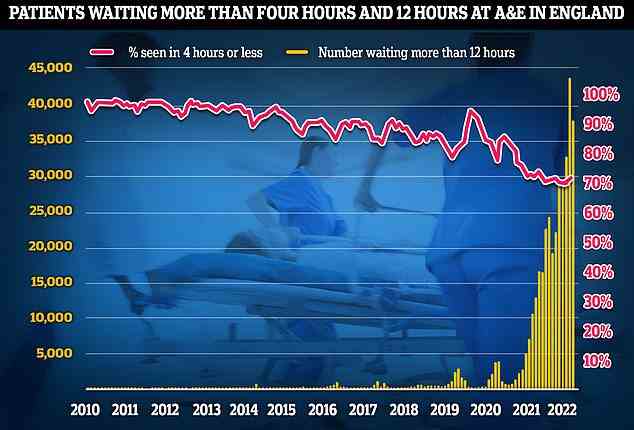
A&E performance worsened in November, with a third of emergency department attendees not seen within four hours (red line) — the NHS’s worst ever performance. Thousands weren’t even seen after waiting in casualty for 12 hours (yellow bars)
Massive queues have slowly built up over the past decade, partly fuelled by an ever-growing proportion of elderly and overweight people.
At the same time as juggling the backlog, A&E and ambulance services have been crippled, causing devastating waits in casualty units and hugely delayed 999 responses.
There is also a staffing crisis, with 130,000 vacancies across the NHS, fuelling the biggest ever strikes in the health service’s history.
Mr Javid was Health Secretary for 13 months. He stepped down in July amid turmoil in Boris Johnson’s Government, fuelled by Partygate and the Chris Pincher groping scandal.
He told Sky News: ‘Having worked up close now with the health service, I don’t think the model of the NHS as it was set up 70 years ago is sustainable for the future.
‘The world has changed and the NHS has not moved on with that.’
He added: ‘Even before the pandemic, it was heading in that direction because of the changing demography, people living longer, and therefore needing more healthcare, and social care for that matter, new medicines and needing that of course.
‘Everyone rightly wants to get access to new medicines and treatments.
‘Also, the changing burden in disease.
‘We have a lot more obese people today, a lot more problems with addictions.
‘So the NHS needs to change with that.
‘And if that wasn’t challenging enough, suddenly the pandemic comes along and makes it much, much worse.’
Mr Javid said he would have ‘liked to have more time’ as Health Secretary to oversee NHS reforms, the starting point of which would be to consider adopting healthcare systems used in other major European countries.
He added: ‘If you speak to any German you might know or French person, Italian, they have good health care systems that were also challenged by the pandemic.
‘But they seem to all be doing better than we are.
‘They are mostly funded by the taxpayer but they also have some different models.’
In Germany, almost everyone pays 7 per cent of their salary into a health insurance scheme, which is matched by their employer. The Government pays for the poorest people.
A similar model is used for in France, although almost everyone also has a private health insurance policy to boost their coverage.
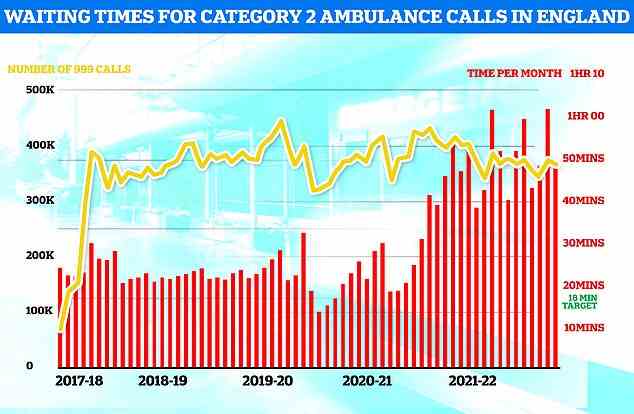
Ambulances took an average of 48 minutes and eight seconds to respond to372,326 category two calls, such as heart attacks, strokes burns and epilepsy (red bars). This is nearly three times as long as the 18 minute target but around 13 minutes speedier than one month earlier
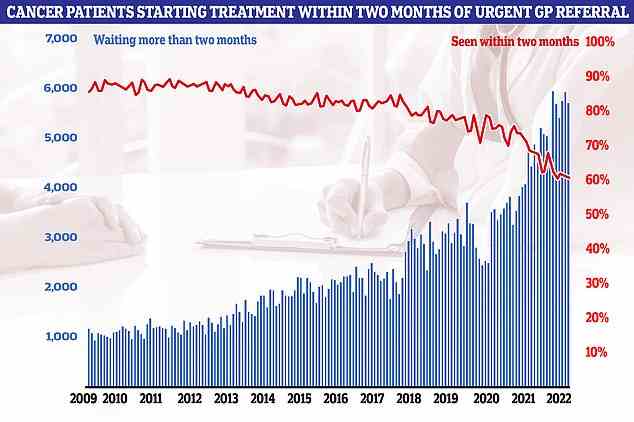
Cancer performance data shows that just six in 10 cancer patients started treatment in October within two months of an urgent referral from their GP (red line). The figure is the second-lowest logged since records began in 2009. NHS targets set out that the figure should be at least 85 per cent. It means 5,728 people waited more than eight weeks to start cancer treatment (blue bars)

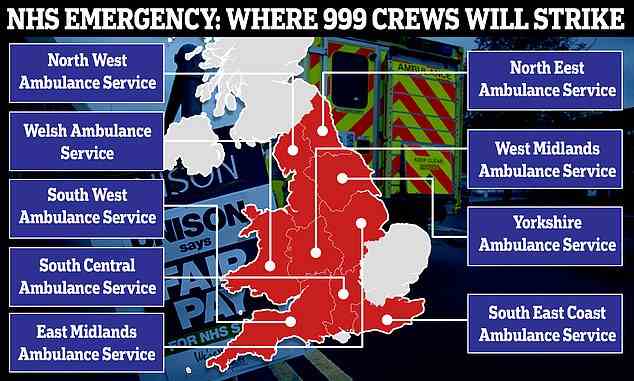
The ambulance strike will affect emergency services across England and Wales on two days

Mr Javid, who announced that he won’t stand as an MP at the next election, declined to endorse one particular model.
But he called for the structure of the NHS, including the option of a ‘co-payment’ — which would see richer people pay for some of their care — to be examined as ‘we need to have this honest debate as a country’.
Ministers in Scotland last month had discussions about a ‘two-tier’ NHS that would see the richest people pay for treatment and end some free prescriptions in a bid to tackle a ‘billion pound hole’ in its budget, according to leaked minutes seen by the BBC.
It is unclear how else a two-tier system would work.
But other options could see wealthier Brits could pay up to £570 to access life-saving emergency care, as is done on the Isle of Guernsey, or exemptions allowing some to access free prescriptions and dentist appointments could be cut.
The idea of a two-tier system goes against the very founding principal of the NHS that treatment should be free for all, whatever their means.
First Minister Nicola Sturgeon and Health Secretary Humza Yousaf said this principle of the NHS were ‘not up for debate’.
But Mr Javid said he would ‘welcome’ discussion on this approach.
He told the broadcaster: ‘The moment a politician of any party says something that is obviously correct about the NHS and the challenges it faces, someone else will just jump down their throat and turn it into something else, you know, turn into the big negative.
‘We all want the NHS to be there. I rely on the NHS, my family, all our loved ones, your loved ones, your viewers.
‘The pressures are so immense, and the pandemic has made it doubly so, that if we as a country, if we neglect this debate now, I am afraid in my opinion — after the experience I’ve had — I don’t think the NHS will survive many more years on what it says on paper it has to deliver unless we start making fundamental reforms.’
He added: ‘It’s not going to be “let’s give it an extra £5-10 billion”. Whilst that might help at the margin without looking at the model of delivery, I’m afraid it’s not going to make enough difference.
‘People are queuing for their operations, for their diagnostics, for ambulances, they are queuing for GPs, and I don’t think anyone thinks that’s a sensible way to go forward.’
One in eight Britons have said they paid for private healthcare in the last year because of record backlogs in the NHS, according to data from the Office for National Statistics.
It asked around 2,500 of adults in the UK whether they had sought care privately because they felt the wait for care was too long in the NHS.
Some 13 per cent said they had gone private, of which 5 per cent used private insurance, while 7 per cent forked out their own cash to do so.
Among those survey who are in the queue for treatment, 34 per cent said waits were having ‘strong negative impact on their life’, including worsening their wellbeing and causing their condition to deteriorate.
Participants also reported struggling to exercise and difficulties with mobility.
Prime Minster Rishi Sunak is registered with a private GP practice that offers next day appointments, it was revealed last month.
The clinic, based in west London, charges £250 for 30-minute appointments, which are available in the evening and on weekend, as well as home visits.
David Hare, chief executive of the Independent Healthcare Providers Network (IHPN), told The Guardian: ‘With NHS waiting lists at record levels, it is not surprising that more people are paying for private treatment, including those who have never previously considered it.’
Dr Tony O’Sullivan, co-chair of campaign group Keep Our NHS Public, told the newspaper that the high numbers seeking out private healthcare is a ‘a damning indictment of the devastating effect this Government’s mismanagement has had on the NHS over the last 12 years’.
He said: ‘No one can blame individuals who are suffering for seeking timelier treatment under the circumstances, but it absolutely doesn’t have to be this way.
‘The NHS was objectively rated the best in the world in 2010. Now healthcare in the UK is rapidly becoming a genuine two-tier system due to the degradation of one of our finest assets, and ultimately we are all poorer for it.’
Latest performance data shows that more than 7.2million patients in England were stuck in the backlog in October — or one in eight people. More than 400,000 have queued, often in pain, for at least one year.
A&E pressures have also worsened, with a third of emergency department attendees not seen within four hours — the NHS’s worst ever performance. Thousands weren’t even seen after waiting in casualty for 12 hours.
Ambulance response times improved slightly. But a third of patients taken to A&E by 999 teams still spent at least 30 minutes stuck in the vehicles outside of hospitals.
The dire statistics cover the state of the health service before a wave of strike action, which began with tens of thousands of nurses walking out yesterday.
Health bosses fear the action, which will also see ambulance staff join picket lines next week, will devastate hospital performances further.
In other related news…
From relying on food banks just to eat and being too busy to care for patients left in their own faeces: Nurses on the picket lines reveal exactly why they’re striking
The Bob Marley-loving ‘taskmaster’ organising NHS’s biggest ever walk-out: Pat Cullen grew up in Northern Ireland during the troubles and has five nursing sisters
What is the truth about NHS nursing crisis? Fascinating graphs show how crippled sector’s pay has stagnated over past decade
Never off duty! Striking NHS nurses ditch -8C picket line to give first aid to man who collapsed outside hospital

